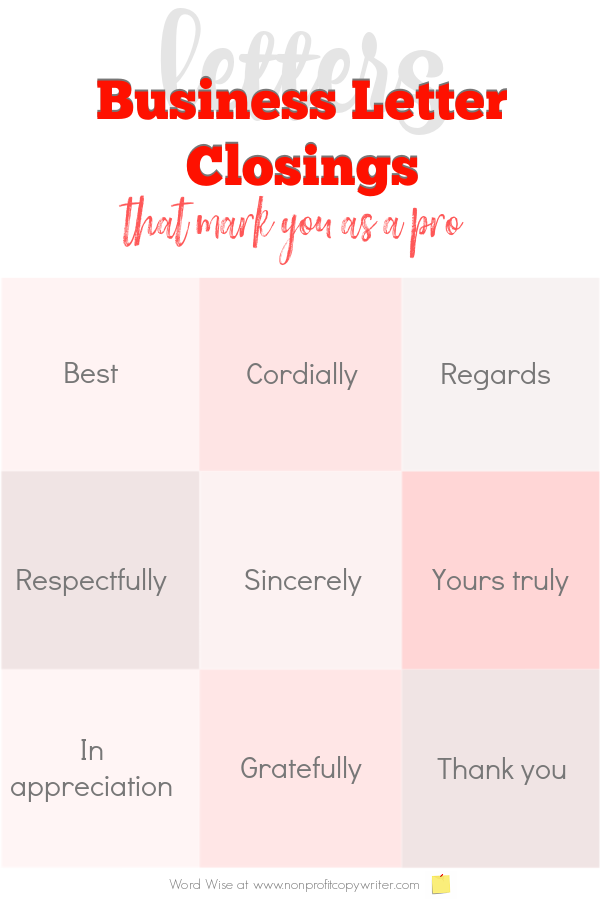Save Time: Get 5 Simple Writing Tips
you can put to use in 10 minutes
Beyond Yours Truly: Business Letter Closings That Mark You as a Pro
Award-winning writer Kathy Widenhouse has helped hundreds of nonprofits and writers produce successful content , with 750K+ views for her writing tutorials. She is the author of 9 books. See more of Kathy’s content here.
Updated 2.1.25
You’ve completed your cover letter … inquiry letter … sales letter … or another business letter. Now it’s time to sign off. You want to finish strong with your letter closing.
A letter closing, also called a “complimentary close,” is the short phrase you use when you end a letter or email. It comes before your signature. And there are plenty of business letter closings you can choose, ranging from Respectfully yours on one end of the spectrum and Ciao, man on the other.
It’s tempting to just go with Yours truly and be done with it. But can one closing fit all? Not really.
A simple rule of thumb for business letter closings
Fortunately, there’s a simple writing guideline to follow as you end a professional letter: use a closing phrase that reflects your relationship with the reader. “While no one may notice an appropriately chosen complimentary closing, everyone will notice an inappropriate one,” says Houston-based journalist Samantha Gluck in Houston Chronicle Small Business. “Use a complimentary closing that reflects the formality you wish to convey and your familiarity with the reader.”
If the letter is to your supervisor or to a business prospect you haven’t met, sign off with a more formal, respectful phrase. If the letter is to a colleague with whom you’ve worked for six years, your tone can be more personal and relaxed.
So before you slap on a Cheers or Take care right before your signature, pause for a minute. Did you open your letter with Hey? If not, then choose one of these business letter closings.
Formal business letter closings examples
Best
Variations: Best regards, Best wishes, My best, All the best
Best regards has a formal tone. Best is less so, yet still conveys a professional relationship. My best is more personal — you’re including yourself in the closing. Best wishes and All the best have a tone of finality. They’re a good option if you’re closing out communication or saying goodbye, such as a letter that completes a business deal.
Cordially
Variation: Cordially yours
I’ve yet to hear Cordially in regular conversation. That means if you’d like to convey a higher level of formality, this closing is a good one to use.
Regards
Variations: Kind regards, Warm regards
Regards shows respect yet familiarity — not uber-formal, yet not bosom buddies. You can warm up the respect (Warm regards) or add a bit of thoughtfulness (Kind regards) as the relationship warrants.
Respectfully
Variations: Respectfully yours, With respect
Respectfully is a formal sign-off that shows deference, whether it’s for a person or a position.
Sincerely
Variation: Sincerely yours
Sincerely is a sturdy, reliable business letter closing. You can’t go wrong when you’re sincere, no matter the degree of formality you require with the reader. Use it and you add a layer of credibility to your letter or email.
Yours truly
Variation: Truly yours, Very truly yours
Some consider Yours truly to be a go-to business letter closing. Yet for me, truly lays on the sincerity a bit thick. And if you eliminate truly, you’re left with Yours — a very personal closing.
Business letter closings that convey gratitude
Gratitude is a powerful tool in business dealings. It’s a courtesy that is becoming increasingly rare. Convey gratitude with authenticity and you’ll build bridges with your readers.
In appreciation
Variations: With appreciation, Appreciatively, With sincere appreciation
Everyone likes to be appreciated. If you’re writing to express thanks, this set of closings is no-fail.
Gratefully
Variations: In gratitude, With gratitude
Gratefully is a classy close when the situation is appropriate, as in a thank you letter from an executive director for a financial or in-kind gift to a nonprofit or an executive’s thank you to an employee for his service. With gratitude and In gratitude communicate thanks in the same way, just a bit more formally.
Thank you
Variations: Thanks, Thanks again, With sincere thanks
Thank you and Thanks are often used in a formal letter’s last paragraph, rather than as a close. If you’re writing informally or personally to a business associate, you can sign off with one of these variations.
Extra tips for business letter closings
- Capitalize just the first word (Kind regards rather than Kind Regards).
- Follow the sign off with a comma.
- In print letters, allow about an inch for your hand signature.
- In an email, include your email signature.
The last word on business letter closings
“Business, after all,” said auto executive Lee Iacocca (1924–2019), “Is nothing more than a bunch of human relationships.”
That means writing a business letter involves more than just mechanics. It reveals your social awareness. Your letter closing marks you as a pro when it reflects the relationship you have with the reader.
More Letter Writing Tips
30 Kinds of Letters You Need to Know How to Write ...
Basic letter writing format: four standard layouts ...
Writing a good cover letter: a step-by-step writing guide ...
How to write a P.S. with punch ...
Letter writing tip: try this opening line ...
More letter writing tips on our Pinterest board ...
Return from Beyond Yours Truly: Business Letter Closings
to Nonprofit Copywriter home
As an Amazon Associate I earn from qualifying purchases.
Share This Page

Named to 2022 Writer's Digest list
BEST GENRE/NICHE WRITING WEBSITE


Stop Wasting Time!
Grab your exclusive FREE guide, "5 Simple Writing Tips You Can Put to Use in 10 Minutes or Less"












